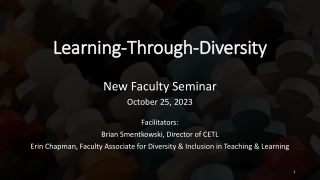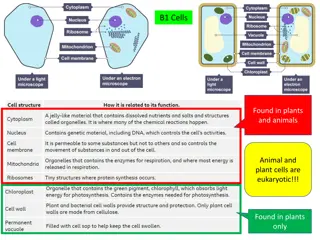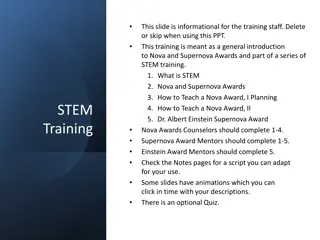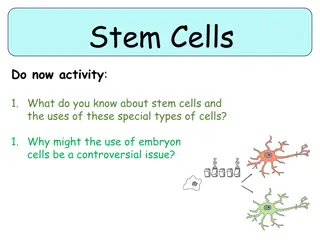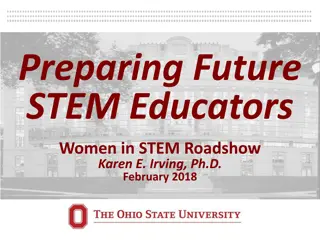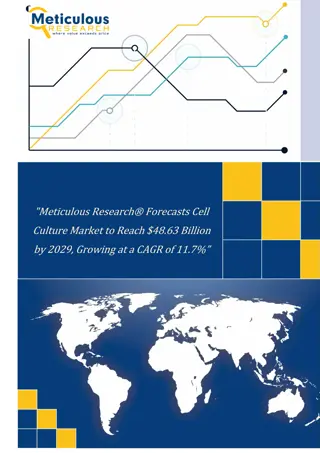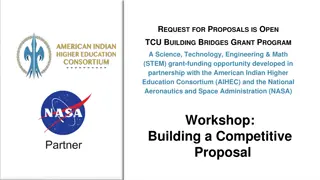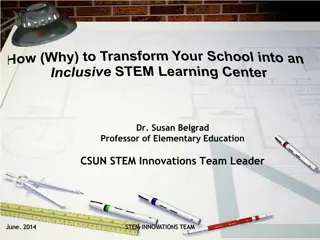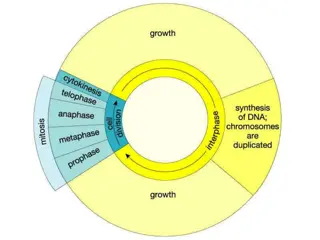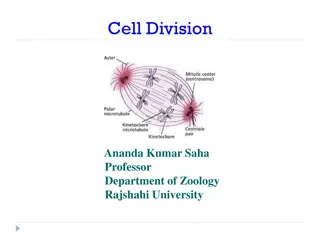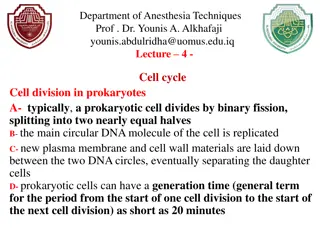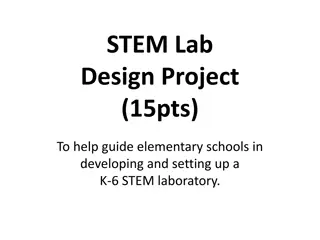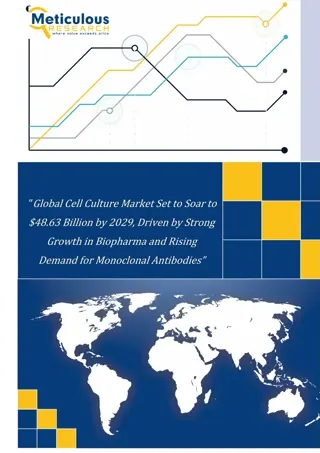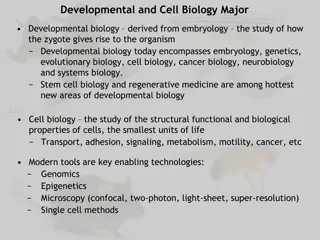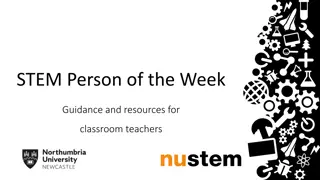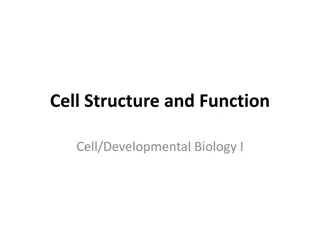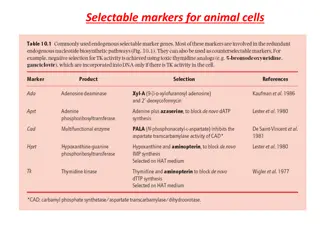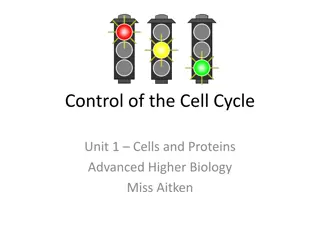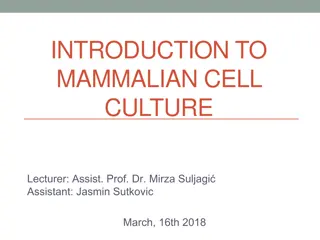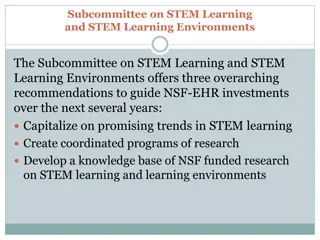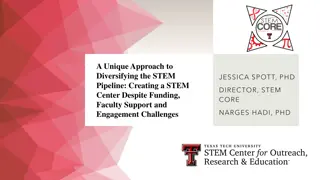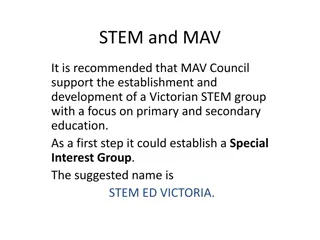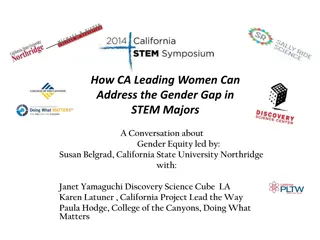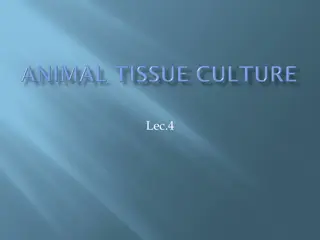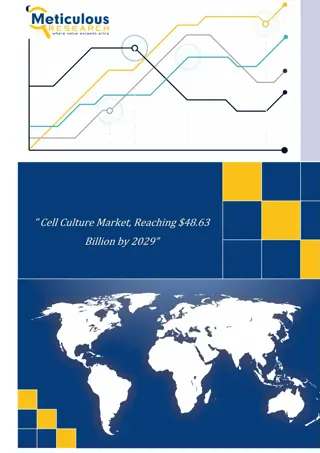Enhancing STEM Education Through Diversity and Inclusion
Discover how the Center for the Integration of Research, Teaching, and Learning (CIRTL) aims to enhance excellence in STEM undergraduate education by developing a national faculty committed to implementing evidence-based teaching practices for diverse learners. Explore the concept of learning throug
0 views • 19 slides
Vi-CELL.BLU - Advanced Cell Counting Instrument
Vi-CELL.BLU is a cutting-edge cell counting instrument that offers faster analysis, increased resolution, and improved optical sensor technology for enhanced cell concentration and viability assessments. The device features a user-friendly interface, Trypan blue method for live cell detection, and a
1 views • 19 slides
Understanding Cell Viability Assays in Laboratory Testing
Cell viability assays play a crucial role in determining the health and status of cells, measuring their ability to survive and proliferate. These assays involve various techniques such as dye exclusion, colorimetric, fluorometric, luminometric, and flow cytometric assays. By assessing factors like
6 views • 16 slides
A Comprehensive Overview of ATS STEM Framework for Teachers
Explore the ATS STEM framework for teachers, focusing on key principles like problem-solving design, disciplinary knowledge, and integrated STEM practices. Discover how to incorporate transversal competencies and formative assessments into STEM education, supported by real-world contexts and appropr
0 views • 76 slides
Bacterial Cell Structure and Composition Overview
Bacterial cells exhibit variations in size, typically ranging from 0.75 to 1.5 micrometers. The cell envelope, comprising glycocalyx, cell wall, and cell membrane, plays crucial roles in protection and cell function. The cell membrane, a thin barrier rich in phospholipids and proteins, is integral t
1 views • 28 slides
Overview of Cell Culture Methods and Importance in Research
Introduction to the principles of cell culture, including tissue culture, organ culture, and cell culture methods. Discusses the advantages and disadvantages of each technique and highlights the need for cell culture in research for studying cellular behavior and large-scale production of cell mater
1 views • 45 slides
Cell Structure and Function: A Comprehensive Overview
Delve into the world of cells, exploring the distinct features of animal and plant cells, the differences between prokaryotic and eukaryotic cells, the significance of organelles, and the fascinating processes such as stem cell differentiation and cell adaptation. Discover how substances move across
0 views • 5 slides
STEM STARS Institute - Empowering Future STEM Educators
STEM STARS Institute focuses on enhancing science and math education for preK-12 students in the Deep South through innovative teacher residency programs. Supported by a National Science Foundation grant, the initiative aims to provide certified instructors to students in Arkansas, Mississippi, and
3 views • 12 slides
Introduction to STEM Training for Nova and Supernova Awards
This presentation serves as a general introduction to Nova and Supernova Awards as part of a STEM training series for scouting staff. It covers topics such as understanding STEM, teaching Nova Awards, the Einstein Supernova Award, and incorporating STEM into scouting programs. The content includes i
3 views • 16 slides
Understanding Stem Cells and Their Applications
Stem cells are unique cells that have the potential to develop into various types of cells in the body. They play a crucial role in renewing and repairing tissues, offering hope for treating various medical conditions. While adult stem cells can differentiate into limited cell types, embryonic stem
0 views • 9 slides
Empowering Future STEM Educators for a Brighter Tomorrow
Delve into the world of STEM education through the lens of Dr. Karen E. Irving's insightful roadshow in February 2018. Explore the challenges and opportunities in preparing the next generation of STEM professionals. Discover the importance of effective teaching in bridging the gap between STEM conte
0 views • 45 slides
Regulation of the Cell Cycle: A Comprehensive Overview
Variation in cell cycle length in humans, controlled by internal and external mechanisms, with special proteins and checkpoint systems ensuring proper progression. External events trigger initiation and inhibition of cell division, while internal checkpoints maintain genetic integrity and chromosome
4 views • 14 slides
Meticulous Research® Forecasts Cell Culture Market to Reach $48.63 Billion by 2029, Growing at a CAGR of 11.7%”
Cell Culture Market by Product [Consumables (Media, Reagents, Sera, Cell Lines), Equipment (Bioreactor, Centrifuge, Cell Counter)], Application (Bioproduction, Cancer Research, Stem Cell, Diagnostic), End User (Pharma, academic) - Global Forecast to
0 views • 3 slides
Building Bridges Grant Program for STEM Education
TCU Building Bridges Grant Program offers funding opportunities for Tribal Colleges & Universities faculty-led teams to enhance STEM education, research, and curriculum. The program aims to increase student engagement in STEM activities, enrollment in STEM degree programs, and strengthen STEM capaci
0 views • 21 slides
Transforming Your School into an Inclusive STEM Learning Center
Transforming a school into an inclusive STEM learning center involves creating a conducive environment for all students to excel in STEM disciplines. By implementing project-based learning, focusing on core STEM subjects, and addressing workforce development strategies, schools can empower diverse l
0 views • 29 slides
Exploring STEM Careers Through Hands-on Activities
Dive into the world of STEM careers with engaging activities designed to spark curiosity and inspire future problem solvers. Discover how hobbies and interests can lead to exciting opportunities in the STEM field, while building confidence and a sense of belonging in the STEM community. Join us for
0 views • 23 slides
Understanding the Cell Cycle and Mitosis Process
The cell cycle consists of two main periods: Interphase and Mitosis. During Interphase, the cell prepares for division by growing in size and copying chromosomes. Mitosis, the division of the nucleus, results in the formation of two daughter cells with identical chromosome copies. Centrioles and cen
0 views • 26 slides
Understanding Cell Division: Processes and Types
Cell division is a vital process in living cells for growth and reproduction. This article explores the basics of cell division, including the cell cycle, types of cell division (such as mitosis and meiosis), and the initiation of cell division. It also covers key phases like interphase and provides
0 views • 20 slides
Overview of Cell Division in Prokaryotes and Eukaryotic Cells
Cell division plays a crucial role in the growth and reproduction of all organisms. In prokaryotic cells, binary fission is the primary mode of division, while eukaryotic cells undergo a more complex process involving cell growth, DNA replication, chromosome distribution, and cytokinesis. The cell c
0 views • 10 slides
Comprehensive Guide to Setting Up a K-6 STEM Laboratory
In this STEM lab design project, elementary schools are provided with a comprehensive booklet to help them establish a K-6 STEM laboratory. The booklet comprises five parts - Introduction, Description of the Space, Tools & Materials, Safety, and Resources. It covers the essence of STEM education, th
0 views • 14 slides
Global Cell Culture Market Set to Soar to $48.63 Billion by 2029, Driven by Strong Growth in Biopharma and Rising Demand for Monoclonal Antibodies
Cell Culture Market by Product [Consumables (Media, Reagents, Sera, Cell Lines), Equipment (Bioreactor, Centrifuge, Cell Counter)], Application (Bioproduction, Cancer Research, Stem Cell, Diagnostic), End User (Pharma, academic) - Global Forecast to
0 views • 5 slides
Transforming STEM Education in Scotland: Key Findings and Recommendations
This document presents key findings from a survey on professional learning in STEM conducted in June 2017 for Scotland's learners, with insights from educators. The survey received a strong response from various practitioners, highlighting the importance of tailored STEM CLPL programs to achieve Sco
0 views • 11 slides
Explore the World of Developmental and Cell Biology
Developmental biology, stemming from embryology, investigates how organisms evolve from a zygote. It merges various fields like genetics, cell biology, and cancer biology. Cell biology focuses on cell properties and behaviors, using tools like genomics and microscopy. Research areas include cancer c
0 views • 8 slides
Promoting STEM Diversity in Education with STEM Person of the Week
STEM Person of the Week is a teacher-led intervention program aimed at reducing stereotypes around science and scientists. Through posters, postcards, and presentations, students are introduced to diverse STEM role models and encouraged to focus on positive attributes. The initiative helps break dow
0 views • 9 slides
Role of Cell Cycle in Nanoparticle Uptake and Dilution in Cell Population
The cell cycle plays a crucial role in the cellular uptake and dilution of nanoparticles within a cell population. This process involves different phases such as G1, S, G2, and M, each with specific functions related to cell growth, DNA synthesis, protein synthesis, and cell division. Understanding
0 views • 20 slides
Exploring Cell Structure and Function in Developmental Biology
Discover the intricate world of cell structure and function in the context of developmental biology. Delve into the inner workings of organelles, their functions, and how they contribute to cellular activities. Engage in interactive activities like building cell models and playing Cell Detective to
0 views • 14 slides
Allogeneic Hematopoietic Stem Cell Transplantation Overview
This presentation discusses the current status and future directions of hematopoietic stem cell transplantation, focusing on autologous and allogeneic procedures, different sources of stem cells, and various conditioning regimens. It delves into how myeloablative allogeneic bone marrow transplantati
0 views • 32 slides
Understanding Stem Cells and Cell Potency in Animal Cells
Stem cells play a crucial role in animal cells, offering the potential to differentiate into various cell types. Totipotent stem cells are the most versatile, capable of developing into any cell type in the embryo, including extra-embryonic cells. Pluripotent stem cells can give rise to all body cel
0 views • 22 slides
Understanding Cell Cycle Control in Biology
Maintaining control of the cell cycle is crucial to producing healthy daughter cells and preventing mutations that can lead to degenerative diseases like Parkinson's or cancer. Cell cycle checkpoints at G1, G2, and Metaphase ensure the cell meets specific requirements before progressing to the next
0 views • 11 slides
Understanding Cell Structure and Function
Explore the intricate world of cell biology through this comprehensive guide covering the definition of a cell, the characteristics of animal cells, the role of the nucleus, ribosomes, cell structure, organelles, cell membrane, and cell wall. Discover the fascinating details of eukaryotic cells and
0 views • 61 slides
Understanding the Functions of Cell Organelles
Explore the vital functions of different cell organelles such as the cell membrane, nucleus, endoplasmic reticulum, lysosomes, Golgi apparatus, mitochondria, cytoplasm, ribosomes, vacuole, cell wall, chloroplasts, and chlorophyll in a cell. Learn how each organelle plays a unique role in maintaining
0 views • 38 slides
Basics of Mammalian Cell Culture
Mammalian cell culture involves the removal of cells from an organism for growth in a controlled environment. Primary cell cultures can be sub-cultured, leading to the generation of cell lines. Sub-culturing involves transferring cells to fresh growth media for further growth. Different methods and
0 views • 29 slides
Recommendations for Advancing STEM Education
The Subcommittee on STEM Learning and STEM Learning Environments provided three key recommendations for guiding NSF-EHR investments in the coming years. These recommendations include capitalizing on emerging trends in STEM learning, developing coordinated research programs, and creating a knowledge
0 views • 7 slides
The Impact of STEM Ambassadors in Education
STEM Ambassadors, like Mark Gallaway, play a crucial role in inspiring and educating students, teachers, and corporations in the fields of science, technology, engineering, and mathematics. They help improve presentation skills, boost confidence, and enhance understanding of STEM subjects. Through t
0 views • 9 slides
Creating a Diverse STEM Center: Overcoming Challenges and Promoting Inclusion
STEM CORE at Texas Tech University aims to enhance STEM education, outreach, and research while promoting diversity and inclusion. Despite funding and faculty support challenges, they focus on providing services to faculty, K-12 outreach, and fostering an inclusive STEM community through strategic i
0 views • 8 slides
Empowering STEM Education in Victoria: A Call to Action for MAV Council
Encouraging MAV Council to support the creation of a Victorian STEM group focused on primary and secondary education. The proposal includes establishing a Special Interest Group named STEM ED VICTORIA. The document highlights the essential skills, ways of thinking, and knowledge valued in STEM field
0 views • 14 slides
Addressing the Gender Gap in STEM Majors: Insights from Leading Women
Successful women leaders in science and engineering are collaborating with informal science organization leaders to address the gender gap in STEM majors. They aim to encourage girls to enroll and persist in STEM K-15 curricula, fostering a sense of belonging in technology and engineering discipline
0 views • 15 slides
Insights into Successful K-12 STEM Education Initiatives
Delve into a comprehensive report on successful K-12 STEM education, focusing on identifying effective approaches in Science, Technology, Engineering, and Mathematics. The report outlines criteria for determining success in STEM education, emphasizing goals to expand student participation in STEM ca
0 views • 13 slides
Understanding Animal Tissue Culture and Cell Line Production
Animal tissue culture involves growing tissues separate from the animal in a laboratory setting. To achieve exponential cell growth, cells are converted into immortal cell lines. The production of a cell line involves steps like breaking cell adhesion, incubation, and transferring cells to fresh med
0 views • 22 slides
Cell Culture Market, Reaching $48.63 Billion by 2029
Cell Culture Market by Product [Consumables (Media, Reagents, Sera, Cell Lines), Equipment (Bioreactor, Centrifuge, Cell Counter)], Application (Bioproduction, Cancer Research, Stem Cell, Diagnostic), End User (Pharma, academic) - Global Forecast to
0 views • 5 slides
